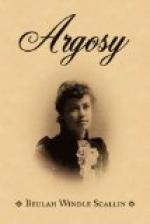A noise, low and faint at first, just taking the edge of silence with a musical murmur that seemed to die out for an instant now and again, then coming again stronger than before, and so growing by fine degrees louder and more confirmed, and resolving itself at last into a sound which could not be mistaken for that of anything but falling water. The sound was clearly in front of me; I was being swept resistlessly towards it. A curve of the river and a swelling of the banks hid everything from me. The sound was momently growing louder, and had distinctly resolved itself into the roar and rush of some great body of water. I shuddered and grasped the sides of the boat with both hands.
Suddenly the curve was rounded, and there, almost in front of me, was a mass of buildings, and there, too, spanning the river, was what looked to me like a trellis-work bridge, and on the bridge was a human figure. The roar and noise of the cataract were deafening, but louder than all was my piercing cry for help. He who stood on the bridge heard it. I saw him fling up his hands as if in sudden horror, and that was the last thing I did see. I sank down with closed eyes in the bottom of the boat, and my heart went up in a silent cry to Heaven. Next moment I was swept into Scarsdale Weir. The boat seemed to glide from under me; my head struck something hard; the water overwhelmed me, seized on me, dashed me here and there in its merciless arms; a noise as of a thousand cataracts filled my ears for a moment; and then I recollect nothing more.
(To be continued.)
SONNET.
Wouldst thou be happy, friend,
forget, forget.
A curse—no blessing—Memory,
thou art;
The very torment of a human
heart.
Ah! yes, I thought, I still
am young; and let
My heart but beat, I can be
happy yet.
Upon a friendly face clear
shone the light;
Without, low moaned the mountain’s
winds, and night
Closed our warm home—sad
words of fond regret.
A voice which in my ear no
more shall ring;
A look estranged in hate like
lightning came,
My very soul within me died
as flame
By strong wind spent.
It was not grief, for dead
Was grief; nor love, for love
in wrath had fled;
It was of both the last undying
sting!
JULIA KAVANAGH.
THE BRETONS AT HOME.
BY CHARLES W. WOOD, F.R.G.S., AUTHOR OF “THROUGH HOLLAND,” “LETTERS FROM MAJORCA,” ETC. ETC.
The long grey walls, the fortifications, the church towers and steeples, the clustering roofs of St. Malo came into view.
It is a charming sight after the long and often unpleasant night journey which separates St. Malo from Southampton. The boats leave much to be desired, and the sea very often, like Shakespeare’s heroine, needs taming, but, unlike that heroine, will not be tamed, charm we never so wisely. As a rule, however, one is not in a mood to charm.




